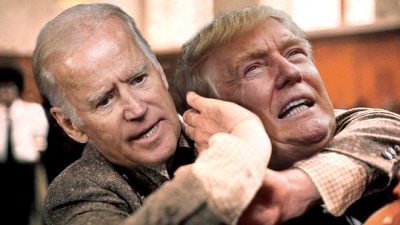US Supreme Court Backs “Grand Theft” Election 2020

On Friday, the Supreme Court declined to hear arguments in what may be remembered one day as the most significant political dispute in US history.
Texas et al v. Pennsylvania et al was the judicial equivalent of Hollywood’s Godzilla v. (King) Kong.
The 1962 horror film was bad fiction. Friday’s Supreme Court action was real life horror, stating the following:
“The State of Texas’s motion for leave to file a bill of complaint is denied for lack of standing under Article III of the Constitution.”
“Texas has not demonstrated a judicially cognizable interest in the manner in which another State conducts its elections.”
“All other pending motions are dismissed as moot.”
The US Constitution’s Article III defines judicial branch and Supreme Court powers.
There’s no ambiguity about brazen election theft for Biden/Harris over Trump.
Arguments presented by Texas AG Ken Paxton were powerful and convincing — supported by constitutional law.
Instead of correcting what he called “a dark shadow of doubt over the outcome of the entire election,” an egregious’ affront to the rule of law, the High Court let it stand — permitting election grand theft instead of reversing it.
Election 2020 was defined by brazen fraud. Yet the Court legitimized what’s illegitimate.
Its nonruling/ruling set a precedent.
Henceforth, US elections decided by brazen fraud will be deemed acceptable as long its ruling class wants their results to stand.
By declining to hear the case, Election 2020 is virtually decided. Injustice triumphed over the rule of law.
On January 20, losers Biden/Harris will be inaugurated.
Trump will move on to other endeavors, his tenure over on that date.
What’s coming next is unclear. A statement by the Texas GOP said the following:
“The Supreme Court, in tossing the Texas lawsuit that was joined by seventeen states and 106 US congressman, has decreed that a state can take unconstitutional actions and violate its own election law.”
“Resulting in damaging effects on other states that abide by the law, while the guilty state suffers no consequences.”
“This decision establishes a precedent that says states can violate the US constitution and not be held accountable.”
“This decision will have far-reaching ramifications for the future of our constitutional republic.”
“Perhaps law-abiding states should bond together and form a Union of states that will abide by the constitution.”
Trump’s legal advisors Rudy Giuliani and Jenna Ellis said they may file new lawsuits in US district courts following the Friday SCOTUS decision not to hear Texas v. Pennsylvania arguments.
Calling its move a “terrible mistake,” Giuliani added:
“Basically the courts are saying they want to stay out of this.”
“They don’t want to give us a hearing.”
“They don’t want the American people to hear the facts.”
“These facts will remain an open sore in our history unless they get resolved.”
“They need to be heard. They need to be aired, and somebody needs to make a decision on whether they’re true or false.”
“And some courts are going to have to have the courage to make that decision.”
“The case wasn’t rejected on the merits the case. (It) was rejected on standing.”
“The answer to that is to bring the case now to the district court by the president, by some of electors alleging the same facts where there would be standing and therefore get a hearing.”
According to Ellis, a “line of attack” going forward remains.
Trump’s legal team can continue challenging Election 2020 results until Congress affirms Electoral College votes on January 6.
That’s the line in the sand after which no further challenges may be legally made.
Ellis slammed the High Court’s decision for failing to uphold constitutional law on what one day may be remembered by historians and jurists as inaction at a time when it was vitally needed.
Hearing, seeing, and speaking no evil, 7 of its 9 justices buried their heads in the sand by ignoring brazen election fraud. See below.
Letting it stand affirmed its triumph over an open, free, and fair process — judicially gone by Friday’s coup de gras.
A Final Comment
Justices Alito and Thomas disagreed with Friday’s decision, Alito saying:
“In my view, we do not have the discretion to deny the filing of a bill of complaint in a case that falls within our original jurisdiction,” adding:
He would have denied the Texas request to halt election certification.
“In my view, we do not have the discretion to deny the filing of a bill of complaint in a case that falls within our original jurisdiction.”
Trump’s three appointed High Court justices — Gorsuch, Kavanaugh and Barrett — failed to stand with him on this monumental issue.
Regardless of what steps Trump’s legal team pursues ahead, it’s virtually over. The postmortems alone remain.
*
Note to readers: please click the share buttons below. Forward this article to your email lists. Crosspost on your blog site, internet forums. etc.
Award-winning author Stephen Lendman lives in Chicago. He can be reached at [email protected]. He is a Research Associate of the Centre for Research on Globalization (CRG)
His new book as editor and contributor is titled “Flashpoint in Ukraine: US Drive for Hegemony Risks WW III.”
http://www.claritypress.com/LendmanIII.html
Visit his blog site at sjlendman.blogspot.com.

